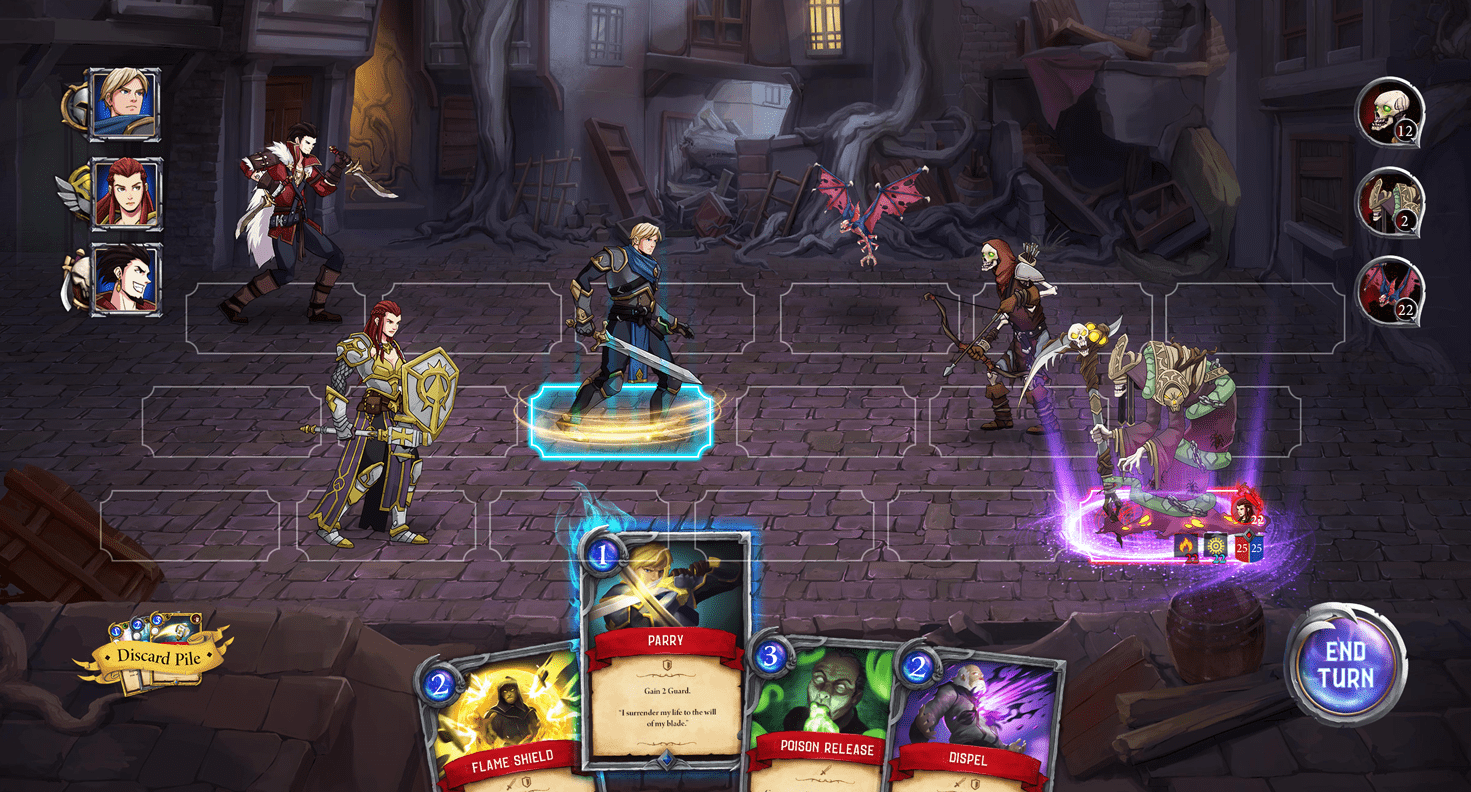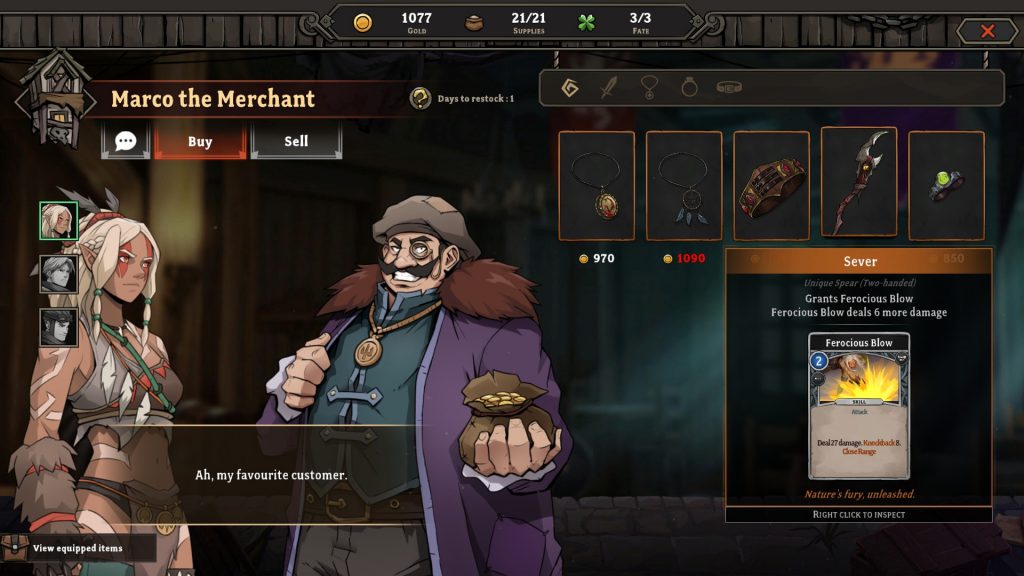Search
[{{{type}}}] {{{reason}}}
{{/data.error.root_cause}}{{{_source.title}}} {{#_source.showPrice}} {{{_source.displayPrice}}} {{/_source.showPrice}}
{{#_source.showLink}} {{/_source.showLink}} {{#_source.showDate}}{{{_source.displayDate}}}
{{/_source.showDate}}{{{_source.description}}}
{{#_source.additionalInfo}}{{#_source.additionalFields}} {{#title}} {{{label}}}: {{{title}}} {{/title}} {{/_source.additionalFields}}
{{/_source.additionalInfo}}- Details
- Category: Computer
- By Daniel Cullen
- Hits: 2247
Gordian Quest (PC) (Preview)

Gordian Quest
Developed By: Mixed Realms Pte Ltd, Swag Soft Holdings Pte Ltd
Published By: Mixed Realms Pte Ltd, Coconut Island Games
Released: March 27, 2020
Available On: Microsoft Windows
Genre: RPG, Strategy
ESRB Rating: None specified
Number of Players: Singleplayer
Price: $19.99
(Humble Store Link)
Note: This review covers the stable and bleeding-edge builds as of the time of publication of this review, with anything specific to each noted as appropriate.
I'd like to thank Mixed Realms Pte Ltd, Coconut Island Games for the preview key for this title.
Tabletop gamers and tactical card gamers have a lot in common. Both play role-playing games where numbers are important to juggle for victory, both have the long-term game experience to consider as well as the short term, and both have "random chance" as their worst enemy/greatest ally to contend with. Gordian Quest is a PC fusion of the two genres that generally succeeds in recreating this gameplay in a digital format.
The story is set in a fantasy world where two groups, regular humans and Vanai, existed together, and the Vanai (with some degree of human apathy and collusion) decided to meddle in the realm of the supernatural (necromancy especially), which angered the gods. The land was splintered into sections, each cursed with the fallout of the stupidity of the divine meddling. While the gods are happy to see humanity clean up the mess, they otherwise have left the task of wiping out all the abominations the Vanai created to us.
This premise sets the stage for a game split into several acts, where you and a bunch of questing heroes set out to destroy all the mortal and supernatural threats plaguing each realm until the monsters unleashed in the backstory are gone for good. Each act is self-contained, only certain bonuses are retained between them, so each act is both an independent adventure and connected to the larger whole.
Combat is a mix of turn-based tactical card combat and some meta-gaming, in which enemies and allies have separate battle grids they must use to launch attacks from onto the foes on the opposing side until victory is achieved. These grids can be afflicted by terrain penalties, offering tactical advantages and disadvantages to both sides. The meta-gaming aspect is that the card decks that make up the character's actions can be customized over time, and long-term planning how you want your character's actions to be oriented will determine how well they adapt to different foes and combat situations.

Strong Points: Deep and involved strategy gaming; good music
Weak Points: Some unfinished and half-baked game mechanics; some game balance issues
Moral Warnings: Mild language used on occasion (d*mn generally, mostly in a religious sense); Some blood and mild gore in combat, though the remains disappear after death; a few mildly exposing outfits; frequent displays of the undead, necromancy, and occult symbols like pentagrams (though they are portrayed in a consistently negative light); optional unethical decisions are available (though they always have negative consequences)
Outside of combat, the player moves around the node-based overworld and dungeon maps, which trigger combat encounters and other events with positive and negative consequences. A dice-based random chance element is a feature of many of these events, though as the player succeeds at some of them, they can build up "Fate" points that can be used to do over bad dice rolls for future events, and these points can be periodically attained as a further safety net of sorts.
The remaining parts of the game revolve around "hub towns" in each part where the player can purchase supplies and upgrade equipment. Quest rewards are also redeemable at these hub towns, and they also serve to help unlock waypoints for quicker travel across the map. Given traveling outside the walls of these towns costs supplies you have to periodically replenish, unlocking waypoints is critical. Dungeon maps are exempt from using supplies but can be dangerous due to having lots of enemy encounters and their dice rolled events of both positive and negative consequences.
Graphically, the game uses a hand-drawn, 2D approach. While many battle figures have some degree of animation (notably Live2D style in appearance), the rest is fairly static on the world map and visual novel style conversation screens. The styling is a mix of high fantasy and low fantasy, with the models of most things reflecting the high fantasy aesthetic while having the muted colors of the low fantasy genre. Given the backdrop of the game, this works rather nicely for setting the mood.
Controls are done primarily using the mouse. Whether moving node to node on maps (both world map and in battles), or changing equipment or picking battle cards in combat, everything is done by a mouse click. The interface is quite responsive in general to this input, though it can be TOO fast if you click too fast in combat and end a turn before a character has picked any actions. Otherwise, there are no complaints here.
The music is a heavy mix of ambient and orchestral fantasy styled soundtracks and sounds quite good, especially if you have excellent speakers or headphones. The sound effects, by contrast, are adequate for the game, but nothing spectacular. They also sound pleasant on the ear.
Stability is a two-tiered question (this is in early access after all), given there are stable and bleeding edge builds of the game. Both are very stable in a technical sense, they are well optimized on the Unity Engine, and there were no crashes, hanging, or turning my computer into a fireball were ever noticed. Both builds do have some unpolished and unfinished game mechanics, as the enchanting service for improving equipment felt unintuitive and half-baked. The bleeding edge builds do have some game balance issues, but given they are bleeding-edge builds, this is to be expected. Overall, both stable and bleeding-edge builds are quite solid in terms of general performance.

Higher is better
(10/10 is perfect)
Game Score - 84%
Gameplay - 17/20
Graphics - 8/10
Sound - 7/10
Stability - 5/5
Controls - 5/5
Morality Score - 62%
Violence - 4.5/10
Language - 8/10
Sexual Content - 9/10
Occult/Supernatural - 1/10
Cultural/Moral/Ethical - 8.5/10 (+6 for condemnation of necromancy and emphasizing respect of divine authority in regards to not trifling with the supernatural)
Morally, this game has several areas of concern.
Violence is going to be pretty gross. Since this game heavily revolves around RPG style combat against undead horrors and mortals doing evil things, there is a fair amount of blood and some mild gore when they die. It's isn't super detailed levels of violence, the art style does not lend itself to this, but it's gruesome enough you can tell whatever died met their end messily, even though the remains disappear soon after they perish.
Language is surprisingly mild. There are a few instances of "d**n" and a fair amount of those are in a religious context, given the slaying undead horrors theme, but it's enough to be noteworthy. Sexual content is also rather restrained, with most outfits being very sensible, a cleavage-baring breastplate here and midriff bared there, but sexuality is generally not a large focus of this title.
The occult and supernatural play a MAJOR role in the story, generally in the negative sense. Defiling the dead and tampering with the supernatural realm in utter defiance of the in-game religion (which is generically polytheist but has practices and morals equivalent to most standard depictions of Christianity) is the impetus of the plot, and your heroes will fight the undead and necromancers along with various other otherworldly beings born as a result of breaking these aforementioned taboos. Your heroes are firmly on the side of not being allowed to use dark powers, only using generic holy themed powers and at best being able to summon fairy tale type "spirit animal" guardians, within the boundaries of the in-game religion (that are allowed based on the faith of the party fighting against evil).
That said, a lot of the trappings of the occult are present, including pentagrams and descriptions of occultist practices. Again, this is presented in a negative light, but it's still quite frequent in appearance. On the positive side, the game is insistent necromancy and tampering with powers beyond human comprehension in defiance of the divine admonition not to is abhorrent and evil. Morally, it also shows how such things lead others to evil, spread chaos and misery, and how anyone who becomes a devotee of such depraved acts deserves absolute condemnation.
On the ethical front, you do have the choice to do unethical deeds, but these options are always of no benefit and quite often penalize the player, and the game story and gameplay encourage the player to take moral risks, like saving innocent people from monster attacks while refraining from tampering with spiritual shrines and artifacts. There are some very clear exceptions with equally strict rules, again generally in a similar manner as the Bible described such things in the Books of the Law. Specifically, those who have supernatural power are obligated to use it wisely and for the spread of peace and justice, else they receive divine condemnation as a wicked one meant to be stopped.
Overall, despite some game balance issues (which the developers are willing to address) and some game mechanics that are unpolished at present, I had a lot of fun with this game and it's well worth the purchase. Morally, while it goes out of its way to spread a good message about the evils of tampering with the supernatural and how one is obligated to use supernatural power only by divine decree (as God does in the Christian Bible), there is still a lot of occult-like supernatural things on display. While not presented positively, this and the frequent bloody violence are certainly not suitable for children. If you are mature enough to handle these themes, I recommend this game for a good strategy RPG experience.






